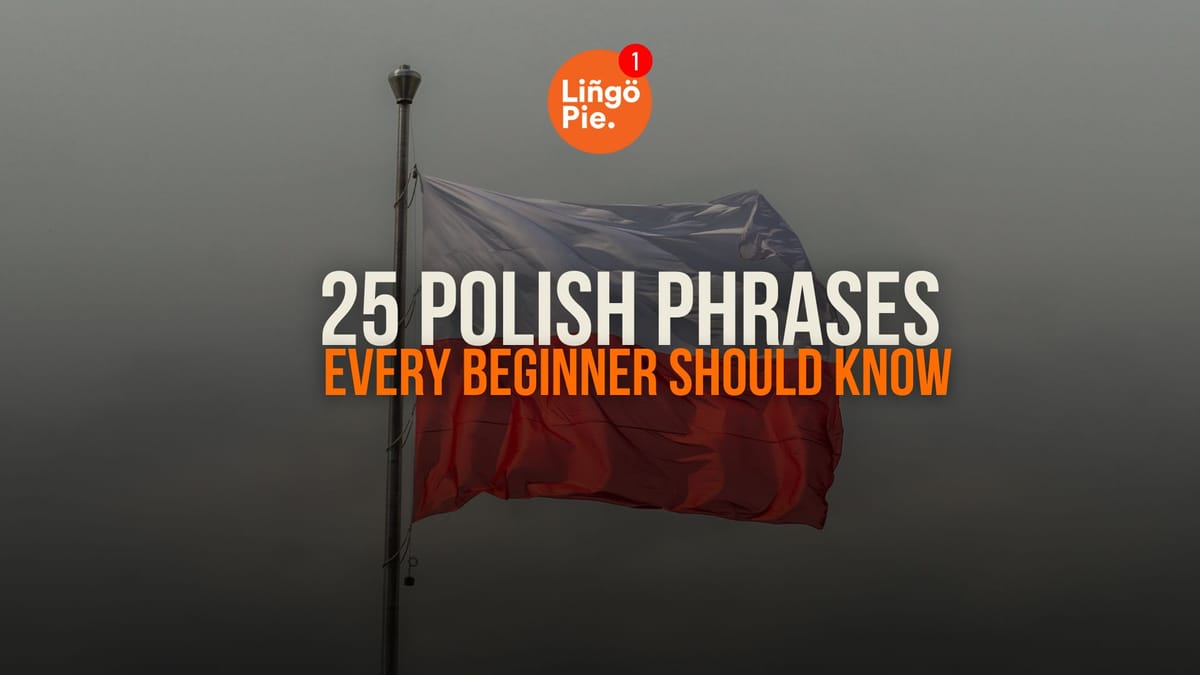Want to start speaking Polish right away? Learning a few basic phrases is the fastest way to do it. You don't need perfect grammar or a huge vocabulary—just these essential expressions will help you order food, ask for directions, and chat with locals.
In this post, you’ll learn 25 Polish phrases that actually matter. We've grouped them by situation, such as greetings, polite expressions, questions, and emergencies, so you know exactly when to use each one. Let's begin!
- 5 Best Apps To Learn Polish As A Beginner [2025]
- What’s The Best Way To Learn Polish Quickly? [Guide]
- Polish Grammar Basics For Beginners [Guide]

Why Learn Polish Phrases First?
Phrases get you speaking on day one. Instead of spending weeks on grammar rules you'll forget, you memorize ready-to-use expressions that work in real situations. You can order food, ask for directions, and make small talk without knowing why the words are structured that way.
Practical benefits:
- Order at restaurants without pointing at menus
- Greet shop staff properly and avoid awkward silence
- Ask for help when you're lost
- Show respect in formal situations with Pan/Pani
- Handle basic transactions without switching to English
- Make better first impressions with locals
- Build confidence through immediate small wins
Polish Greetings & Basic Courtesies
Polish culture takes politeness seriously. You'll notice people always greet shop staff, taxi drivers, and anyone they interact with—skipping a greeting feels rude. Below are some of the most important POlish phrases you need to learn.
| Polish | Pronunciation | English |
|---|---|---|
| Dzień dobry | jen DOH-bry | Good morning/Hello |
| Cześć | cheshch | Hi/Bye |
| Dobry wieczór | DOH-bry VYEH-choor | Good evening |
| Do widzenia | doh vee-DZEN-ya | Goodbye |
| Dziękuję | jen-KOO-yeh | Thank you |
| Proszę | PROH-sheh | Please/You're welcome |
| Przepraszam | pshe-PRA-sham | Sorry/Excuse me |
| Tak | tak | Yes |
| Nie | nyeh | No |
| Jak się masz? | yak shye mash | How are you? (informal) |
Basic Polish Conversation Starters

Poles are naturally curious about where you're from and why you're learning their language. When you introduce yourself, expect follow-up questions about your background. The phrase "Miło mi cię poznać" is standard after meeting someone, but remember to adjust it—"Miło mi Pana poznać" for men and "Miło mi Panią poznać" for women in formal contexts.
If you mention you're learning Polish, most people will be impressed and encouraging, even if you only know a handful of words. Saying "Nie mówię dobrze po polsku" (I don't speak Polish well) early in a conversation sets realistic expectations and usually makes people more patient and helpful.
| Polish | Pronunciation | English |
|---|---|---|
| Jestem [name] | YES-tem | I'm [name] |
| Miło mi cię poznać | MEE-woh mee chyeh poz-NATCH | Nice to meet you (informal) |
| Pochodzę z... | po-HO-dzeh z | I come from... |
| Mówię po angielsku | MOO-vyeh po an-GYEL-skoo | I speak English |
| Nie mówię dobrze po polsku | nyeh MOO-vyeh DOH-zheh po POL-skoo | I don't speak Polish well |
Getting Around & Asking for Help
Poles are generally helpful to tourists, especially in bigger cities. When asking for directions, always start with "Przepraszam" and use "Pan" or "Pani" to show respect. Most people under 40 speak at least some English, particularly in Warsaw, Kraków, and Gdańsk. If someone doesn't understand you, they'll usually try to find someone who does rather than just walking away.
| Polish | Pronunciation | English |
|---|---|---|
| Przepraszam, gdzie jest...? | pshe-PRA-sham, gdjeh yest | Excuse me, where is...? |
| Nie rozumiem | nyeh ro-ZOO-myem | I don't understand |
| Czy mówisz po angielsku? | chy MOO-vish po an-GYEL-skoo | Do you speak English? |
| Czy może Pan/Pani pomóc? | chy MO-zheh pan/PA-nee PO-moots | Can you help me? (formal) |
| Proszę powtórzyć | PROH-sheh pov-TOO-zhyts | Please repeat |
Dining Out Phrases In Polish

Polish dining culture is warm and social. When someone brings food to the table, it's customary to say "Smacznego" before eating—everyone does it, from family dinners to restaurants. Check out the table below to see some of the easiest Polish phrases for dining out.
| Polish | Pronunciation | English |
|---|---|---|
| Poproszę... | po-PROH-sheh | I would like... |
| Poproszę menu | po-PROH-sheh MEH-noo | I would like the menu |
| Smacznego | smach-NEH-go | Enjoy your meal |
| Rachunek poproszę | ra-HOO-nek po-PROH-sheh | The bill, please |
| Poproszę wodę | po-PROH-sheh VO-deh | I would like water |
| Na zdrowie | na ZDROV-yeh | Cheers/To your health |
| Jestem wegetarianinem | YES-tem veh-geh-tar-YA-nee-nem | I'm vegetarian (male) |
| Jestem wegetarianką | YES-tem veh-geh-tar-YAN-koh | I'm vegetarian (female) |
| Czy mogę płacić kartą? | chy MO-geh PWA-cheetch KAR-toh | Can I pay by card? |
| Bardzo smaczne | BAR-dzo SMACH-neh | Very tasty |
Shopping & Money
Polish shops run formal. When you enter, staff will greet you with "Dzień dobry" and expect you to respond the same way. "Zapraszamy" (we invite you) means you're welcome to browse. Asking "Ile to kosztuje?" is standard before buying—haggling isn't common except at outdoor markets.
If you want to communicate better, then be sure to use these expressions below.
| Polish | Pronunciation | English |
|---|---|---|
| Ile to kosztuje? | EE-leh to kosh-TOO-yeh | How much does this cost? |
| Za drogo | za DRO-go | Too expensive |
| Tanio | TA-nyo | Cheap |
| Poproszę to | po-PROH-sheh to | I would like this |
| Dziękuję, do widzenia | jen-KOO-yeh, doh vee-DZEN-ya | Thank you, goodbye |
Start Speaking Polish with Lingopie
You now have 25 practical phrases that cover the most common situations you'll face as a beginner. But learning phrases from a list is just the start—you need to hear them in real conversations to truly understand how they're used. That's where Lingopie can help.
With Lingopie, you learn Polish through authentic TV shows and movies, so you hear these exact phrases in natural contexts. You'll see how Poles actually greet each other, order food, and navigate daily life. The interactive subtitles let you click any word for instant translations, and you can practice pronunciation by repeating after native speakers.
Ready to move beyond basic phrases and start understanding real Polish? Try Lingopie today and learn the language the way it's actually spoken.
FAQ: Learning Polish for Beginners
Is Polish hard to learn?
It can be tricky at first because of pronunciation and grammar, but starting with simple phrases makes it way easier. Once you get used to the sounds, everything begins to click.
How long does it take to learn basic Polish?
With consistent practice, you can start having basic conversations in just a few weeks. The key is using Polish daily — even just a few minutes counts.
What’s the best way to practice Polish phrases?
Listen and repeat! Try using Lingopie to hear native speakers in real shows so you can pick up natural pronunciation and rhythm.
Do Polish people appreciate it when foreigners speak Polish?
Absolutely! Even a simple “Dzień dobry” (Good morning) can earn you a smile and extra patience from locals.
Can I learn Polish just by watching TV shows?
You can learn a lot! Watching Polish shows with subtitles helps you connect words to context — and makes studying feel like entertainment.




![How To Write The Date In Chinese [Guide]](/blog/content/images/2025/10/how-to-write-the-date-in-chinese.jpg)

![I Love You In Polish: Romantic Phrases You Need To Know [2026]](/blog/content/images/size/w300/2026/02/I-Love-You-In-Polish.png)
![How To Say Happy New Year In Polish [15+ Useful Words]](/blog/content/images/size/w300/2025/12/how-to-say-happy-new-year-In-polish.jpeg)

